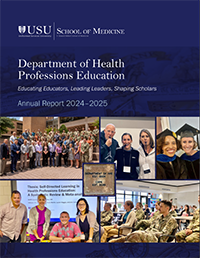Health Professions Education (HPE)
In keeping with the Uniformed Services University's (USUHS) mission, the Department of Health Professions Education (HPE) strives to be the premier provider of health professions (e.g. physicians, dentists, nurses, etc) education for the Military Health System (MHS), Veterans Health Affairs (VA), the Public Health System and beyond. Through leadership in teaching, research, and other scholarship, HPE provides direct benefit to the Uniformed Services and other Federal agencies by producing a cadre of leaders and scholars with expertise in the field of health professions education
Mission
The mission of the Department of Health Professions Education is to be the premier provider of health professions education for the Military and Public Health Systems through leadership in teaching, research, mentoring, service, and innovation. We educate educators, lead leaders and shape scholars. More specifically, HPE will enhance workforce development within USU and across the Military Health System (MHS) by providing advanced education (e.g., graduate certificates and degrees) to active duty and civilian faculty stationed at military treatment facilities (MTFs) across the country, and will conduct important educational research in the MHS (e.g., through the Center for Health Professions Education (CHPE), the Long Term Career Outcome Study (LTCOS) and other HPE faculty programs of research and degree program learners). We do this by:
- Building education, research and leadership capacity through the mentoring of HPE graduate students, health professional trainees (e.g medical students and residents), and faculty members;
- Generating new knowledge in HPE through research and innovative educational practice;
- Developing a collaborative community of inter-professional scholars and educational leaders in HPE;
- Providing faculty support and consultation on curriculum development and innovative instructional strategies;
- and Engaging in education-related knowledge translation activities with the potential to improve patient care and clinical practice.
- Assisting faculty with their distance and blended learning needs through the support of the Distance Learning Lab.
- Building a community of VA and MHS senior academic leaders to enhance collaboration, capacity, and capability of both systems.
Vision
The vision of HPE is to be widely recognized as a global leader for the MHS, VA, Public Health Service, and civilian communities in advancing health professions education through leadership in teaching, research, and innovation.
HPE has a number of core activities. These include the Graduate programs in HPE (two certificates as well as two masters and one doctorate degree in HPE), the Center for Health Professions Education (CHPE), the Long Term Career Outcome Study (LTCOS), the Distance Learning Lab (DL Lab) ,the Simulation and Education Hub, and educational consultations. We offer the Introduction to Foundations in HPE (I-FHPE) and the Foundations in HPE (FHPE) certificates which differ by number of required credits and learners have the opportunity to choose courses that will best fit their professional needs. Our masters degrees are the Master of HPE (MHPE) and Masters of Education in HPE (MEd-HPE) which add a research or culminating project requirement, respectively, in addition to added coursework. The PhD in HPE adds to the MHPE degree by requiring additional courses and additional publications. For more details on our certificate and degree programs, email HPE@usuhs.edu to receive a current digital copy of our handbook.

